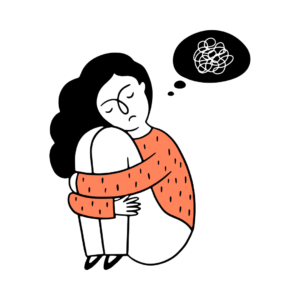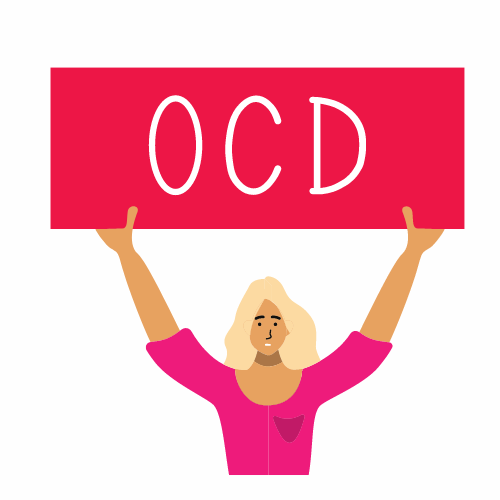
A Deep Dive into the ADHD and GAD Diagnosis Treatment and Support for women
Table of Contents
- Co-occurrence of GAD with Other Disorders
- Diagnostic Criteria for Generalized Anxiety Disorder
- What are the common signs and symptoms of generalized anxiety disorder and ADHD?
- Seeking Treatment
- Treatment for ADHD and Generalized Anxiety Disorder
- Strategies for Managing Generalized Anxiety Disorder and ADHD
- How can loved ones support women with Generalized Anxiety Disorder and ADHD?
- Other Mental Health Tips for Women Related to Generalized Anxiety Disorder
- References
What is Generalized Anxiety Disorder?
Generalized Anxiety Disorder (GAD) is a prevalent mental health condition frequently co-occurring with ADHD, especially in women. When you look at the symptoms, it's easy to see why, as an unsupported ADHD woman, you would have Generalized Anxiety Disorder! In fact, women with ADHD are 4x as likely to have GAD (Fuller-Thomson, Carrique, & MacNeil, 2022).
🌟 Why is it Important to Talk About the Generalized Anxiety Disorder and Adhd in Women? 🌟
Hidden ADHD Symptoms
- Anxiety often makes it hard to spot ADHD in women, leading to underdiagnosis and misdiagnosis. Many doctors mistake ADHD symptoms in women for just being anxious.
Masking and ADHD women
- Women with ADHD are skilled at hiding their struggles, a phenomenon known as masking. The medical field has yet to develop reliable ways to detect when women are masking their symptoms, which is crucial for accurate diagnosis and support.
Gender Bias in Diagnosis of ADHD in Women
- Much of the current diagnostic criteria for ADHD is based on studies of men and boys. This gender bias means that the unique ways ADHD presents in women are often overlooked, preventing many women from receiving the diagnosis they need.
Misconceptions About Functioning
- There's a common but incorrect belief among some doctors that if a woman is doing well in school or work, she cannot have ADHD. This misconception can delay a proper diagnosis, often until significant life changes, like hormonal shifts during perimenopause, exacerbate symptoms.
Impact of Medical Bias for ADHD Women
- These diagnostic challenges are largely due to medical bias. The medical community needs to update its understanding and approach to diagnosing ADHD in women, ensuring that all individuals receive the appropriate care and support.
🌟 Generalized Anxiety Disorder: Symptoms and Diagnostic Criteria 🌟
🧠 Difficulty Concentrating: Individuals with GAD often struggle to focus due to excessive worry. 🚫 Avoidance Behaviors: Avoiding situations or objects that trigger anxiety is a common coping mechanism for those with GAD. 🔍 Pessimistic Worldview: People with GAD frequently interpret situations with heightened fear and mistrust, expecting negative outcomes. ⚠️ Autonomic Arousal: A hallmark symptom of GAD is feeling constantly on edge, hypervigilant, and overly alert. 💪 Muscle Tension: Persistent worry and anxiety often prevent relaxation, leading to chronic muscle tension. 🌙 Sleeplessness: Insomnia is a frequent issue for those with GAD, contributing to mood swings and irritability. 💭 Constant Worry: A core feature of GAD is the relentless focus on potential future problems, leading to ongoing anxiety and stress. 📋 DSM-V Diagnostic Criteria: To diagnose GAD, the DSM-V outlines that individuals must experience excessive anxiety or worry more days than not for at least six months. This anxiety must be difficult to control and must interfere with daily life. Additionally, individuals must exhibit at least three of the following symptoms:❌ Exclusion of Other Disorders: The anxiety or worry is not better explained by another mental disorder, such as panic disorder, social anxiety disorder, obsessive-compulsive disorder, or post-traumatic stress disorder. This combined section provides a detailed yet concise overview of both the symptoms and the diagnostic criteria for Generalized Anxiety Disorder, making it easier for readers to understand the condition.
- Restlessness or feeling keyed up/on edge
- Being easily fatigued
- Difficulty concentrating or mind going blank
- Irritability
- Muscle tension
- Sleep disturbances (difficulty falling/staying asleep, or restless, unsatisfying sleep)

What is ADHD?
The diagnosis of ADHD is based on criteria outlined in the Diagnostic and Statistical Manual of Mental Disorders, Fifth Edition (DSM-5). These criteria include symptoms of inattention and/or hyperactivity-impulsivity that interfere with functioning or development. Symptoms must be present for at least 6 months to a degree that is inconsistent with the individual's developmental level and impacts directly on social and academic/occupational activities. Note that the presentation can vary, and an individual might primarily show symptoms of inattention, hyperactivity-impulsivity, or both.
🌟 Inattention 🌟
- Careless Mistakes
- Often fails to give close attention to details or makes careless mistakes in schoolwork, at work, or during other activities (e.g., overlooks or misses details, work is inaccurate).
- Difficulty Sustaining Attention
- Often has difficulty sustaining attention in tasks or play activities (e.g., has difficulty remaining focused during lectures, conversations, or lengthy reading).
- Doesn't Seem to Listen
- Often does not seem to listen when spoken to directly (e.g., mind seems elsewhere, even in the absence of any obvious distraction).
- Incomplete Tasks
- Often does not follow through on instructions and fails to finish schoolwork, chores, or duties in the workplace (e.g., starts tasks but quickly loses focus and is easily sidetracked).
- Disorganized
- Often has difficulty organizing tasks and activities (e.g., difficulty managing sequential tasks; keeps materials and belongings in disorder; messy, disorganized work; has poor time management; fails to meet deadlines).
- Avoids Sustained Mental Effort
- Often avoids, dislikes, or is reluctant to engage in tasks that require sustained mental effort (e.g., schoolwork or homework; for older adolescents and adults, preparing reports, completing forms, reviewing lengthy papers).
- Loses Necessary Items
- Often loses things necessary for tasks and activities (e.g., school materials, pencils, books, tools, wallets, keys, paperwork, eyeglasses, mobile telephones).
- Easily Distracted
- Is often easily distracted by extraneous stimuli (for older adolescents and adults, may include unrelated thoughts).
- Forgetful in Daily Activities
- Is often forgetful in daily activities (e.g., doing chores, running errands; for older adolescents and adults, returning calls, paying bills, keeping appointments).
🌟 Hyperactivity and Impulsivity 🌟
- Fidgeting or Tapping
- Often fidgets with or taps hands or feet, or squirms in seat.
- Leaves Seat Frequently
- Often leaves seat in situations when remaining seated is expected.
- Runs or Climbs Inappropriately
- Often runs about or climbs in situations where it is not appropriate (adolescents or adults may be limited to feeling restless).
- Difficulty Playing Quietly
- Often unable to play or engage in leisure activities quietly.
- Always 'On the Go'
- Is often "on the go," acting as if "driven by a motor" (e.g., is unable to be or uncomfortable being still for extended time, as in restaurants, meetings; may be experienced by others as being restless or difficult to keep up with).
- Excessive Talking
- Often talks excessively.
- Blurts Out Answers
- Often blurts out an answer before a question has been completed (e.g., completes people’s sentences; cannot wait for turn in conversation).
- Difficulty Waiting Turn
- Often has difficulty waiting his or her turn (e.g., while waiting in line).
- Interrupts or Intrudes
- Often interrupts or intrudes on others (e.g., butts into conversations, games, or activities; may start using other people’s things without asking or receiving permission; for adolescents and adults, may intrude into or take over what others are doing).
🌟 Additional Criteria 🌟
- Early Onset
- Several inattentive or hyperactive-impulsive symptoms were present before age 12 years.
- Symptoms in Multiple Settings
- Several symptoms are present in two or more settings (e.g., at home, school, or work; with friends or relatives; in other activities).
- Impact on Functioning
- There is clear evidence that the symptoms interfere with, or reduce the quality of, social, academic, or occupational functioning.
- Exclusion of Other Disorders
- The symptoms do not occur exclusively during the course of schizophrenia or another psychotic disorder and are not better explained by another mental disorder (e.g., Mood Disorder, Anxiety Disorder, Dissociative Disorder, Personality Disorder).
🌟 Let's See How Generalized Anxiety Disorder and ADHD Look the Same! 🌟
There are significant negative consequences of missed or delayed diagnosis of ADHD in women and girls, including academic, social, and emotional impacts. The symptoms of these two conditions often overlap, making it difficult to distinguish between them. Women also often have both. Let's look at the signs that both Generalized Anxiety Disorder (GAD) and ADHD have in common:ADHD and GAD often occur together. The critical thing to note is that if you have ADHD, it is likely that you will also have GAD, especially if you are a woman. Many women are diagnosed only with GAD and not with ADHD, leading to inadequate treatment. This highlights the importance of accurate assessment and diagnostic tools for ADHD, as we are lagging in our ability to diagnose ADHD accurately.
- Excessive Worry and Restlessness 🤯😟
- Individuals with GAD often experience persistent and excessive worry about various aspects of their lives, such as work, health, finances, and relationships. Similarly, individuals with ADHD may frequently feel restless, finding it hard to relax or sit still.
- Difficulty Concentrating and Staying Focused 🎓🧩
- Both GAD and ADHD can impair an individual's ability to concentrate and maintain focus. In GAD, constant worrying and intrusive thoughts make it challenging to concentrate on tasks. In ADHD, this struggle with concentration and attention is a core feature of the disorder.
- Racing Thoughts and Difficulty Controlling Thoughts 🚀💭
- Those with GAD often experience a stream of racing thoughts, making it difficult to prioritize or control them. Similarly, individuals with ADHD may have a constant flood of thoughts, leading to difficulties in organizing and managing them effectively.
- Physical Symptoms 💪😰
- Physical symptoms can manifest in both GAD and ADHD. Due to persistent anxiety, individuals with GAD may experience muscle tension, headaches, stomachaches, and fatigue. ADHD can cause restlessness, fidgeting, and feeling on edge, leading to physical symptoms like muscle tension and restlessness.
- Sleep Disturbances 😴🌙
- Both GAD and ADHD can disrupt sleep patterns. Individuals with GAD often struggle with falling asleep or staying asleep due to excessive worrying and racing thoughts. Similarly, individuals with ADHD may experience difficulty winding down at night and may have trouble falling asleep.
- Irritability and Mood Swings 😡😢
- Both GAD and ADHD can affect an individual's mood and emotional well-being. Those with GAD may constantly feel on edge, irritable, and easily agitated. Similarly, individuals with ADHD may experience mood swings and difficulty regulating emotions.
- Impulsivity and Reckless Behavior 🚦⚡
- Impulsive decision-making and engaging in risky behavior are core symptoms of ADHD, not GAD. However, impulsivity can sometimes be mistaken for anxiety symptoms.
- Challenges in Daily Functioning 📆📝
- Both GAD and ADHD can significantly impact an individual's daily life and functioning. Both conditions share common difficulties with organization, time management, and completing tasks. Additionally, individuals may struggle with maintaining relationships, meeting work deadlines, and overall productivity.
🌟 Let's See How Generalized Anxiety Disorder and ADHD Are Different! 🌟
While Generalized Anxiety Disorder and ADHD share some overlapping symptoms, they are distinct conditions with unique characteristics. Here's how they differ:
- Primary Focus of Concern 🎯
- GAD: The central feature of GAD is excessive worry and anxiety about various aspects of life, such as work, health, finances, and social interactions. This worry is persistent and difficult to control.
- ADHD: In ADHD, the primary issues revolve around attention, hyperactivity, and impulsivity. Individuals with ADHD may struggle to focus, be easily distracted, or have trouble completing tasks.
- Nature of Symptoms 📉📈
- GAD: Symptoms of GAD are typically more stable and constant, with worry and anxiety being persistent regardless of the situation.
- ADHD: Symptoms can fluctuate more, often depending on the situation or task at hand. For example, someone with ADHD might focus intensely on activities they find engaging (hyperfocus) but struggle with routine or less stimulating tasks.
- Impact on Daily Functioning 🛠️
- GAD: The anxiety in GAD often leads to avoidance behaviors, where individuals may avoid situations or activities that trigger worry, potentially limiting their daily functioning and life experiences.
- ADHD: In ADHD, impairments often manifest as difficulties with organization, time management, and following through on tasks, which can impact academic, professional, and social aspects of life.
- Emotional Regulation 🌊
- GAD: Individuals with GAD often experience heightened and pervasive anxiety, which can lead to physical symptoms like muscle tension, headaches, and fatigue.
- ADHD: Emotional regulation issues in ADHD may manifest as impulsivity, mood swings, and difficulty managing frustration or anger, but these emotions are not necessarily tied to anxiety.
- Cognitive Patterns 💭
- GAD: People with GAD often engage in repetitive, negative thinking patterns and excessive worry about the future.
- ADHD: Cognitive issues in ADHD are more about executive functioning deficits, such as planning, problem-solving, and maintaining focus.
- Response to Treatment 💊💬
- GAD: GAD is often treated with a combination of therapy, particularly Cognitive Behavioral Therapy (CBT), and medications like SSRIs to manage anxiety symptoms.
- ADHD: ADHD treatment typically involves stimulant or non-stimulant medications to manage attention and hyperactivity symptoms, along with behavioral therapies and environmental modifications.

🌟 Strategies for Managing Generalized Anxiety Disorder and ADHD 🌟
Currently, there is a great need to research effective strategies for treating both ADHD and GAD when they occur together. In my practice, these are some of the strategies I use:
-
Embrace Neurodivergent-Affirming Concepts 🌈
- Recover from the trauma that has led you to feel unworthy and damaged. Embracing neurodivergent-affirming concepts can help rebuild your self-esteem and sense of worth.
-
Learn to Advocate for Yourself 🗣️
- Understand and recognize your unique needs and strengths. Standing up for yourself reduces stress and helps others understand and support your journey with ADHD.
-
Practice Setting Boundaries 🚧
- Setting boundaries is crucial, whether it's setting aside time for yourself or limiting interruptions during specific tasks. This helps maintain focus and ensures your needs are met in personal and professional environments.
-
Self-Accommodate 🛠️
- Ask yourself, "What can make things easier on my executive functioning?" This might mean using tools like alarms, calendars, or task lists or creating a designated workspace free from distractions. Tailoring your environment to your needs can significantly boost your productivity and mental well-being.
-
Understand Your Sensory Preferences and Triggers 🎧
- Women with ADHD often have sensory sensitivities. Recognizing what calms you, as well as what overstimulates or irritates you, can help in creating a balanced environment. This might mean using noise-canceling headphones, soft clothing, or dimmable lights.
-
Practice Self-Care 💆♀️
- Taking time to rest, engage in hobbies, and care for your physical and mental well-being is essential. This could include activities like meditation, journaling, exercise, or even simply spending time in nature. Ask yourself, "What do my mind and body need to feel cared for?"
🌟 How Can Loved Ones Support Women with Generalized Anxiety Disorder and ADHD? 🌟
Loved ones can play a crucial role in supporting women living with ADHD and GAD. Here are some ways they can help:
- Educate Yourself 📚
- Take the time to learn about both ADHD and GAD. Understanding the challenges and symptoms associated with these disorders can help you provide the necessary support and empathy.
- Be Patient and Understanding 💖
- Living with both ADHD and GAD can be overwhelming at times. Be patient with your loved one and try to understand that their struggles may not always be visible or understandable. Show empathy and offer a listening ear when they need to talk.
- Offer Practical Help 🏠
- Offer to assist with tasks or chores that may be particularly challenging for someone with ADHD and GAD. This could include organizing their schedule, helping with time management, or offering assistance with daily responsibilities.
- Create a Supportive Environment 🌿
- Foster an environment that is calm, organized, and free of unnecessary distractions. This can help your loved one stay focused and reduce anxiety triggers.
- Encourage Treatment 💊
- Encourage your loved one to seek professional help and stick to their treatment plan. Offer to accompany them to appointments or help with any necessary research or paperwork.
References
Crocq MA. The history of generalized anxiety disorder as a diagnostic category. Dialogues Clin Neuroscience 2017;19(2):107-116. doi:10.31887/DCNS.2017.19.2/macrocq

Fuller-Thomson, E., Carrique, L., & MacNeil, A. (2022). Generalized anxiety disorder among adults with attention deficit hyperactivity disorder. Journal of Affective Disorders, 299, 707-714. https://doi.org/10.1016/j.jad.2021.10.020




